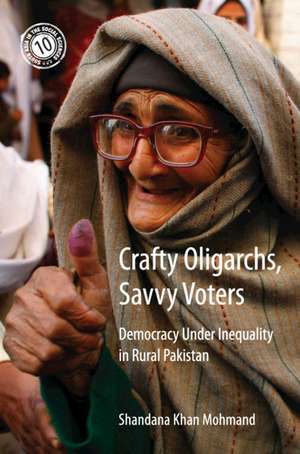Crafty Oligarchs, Savvy Voters: Democracy under Inequality in Rural Pakistan: South Asia in the Social Sciences, cartea 8
Autor Shandana Khan Mohmanden Limba Engleză Hardback – 22 mai 2019
Din seria South Asia in the Social Sciences
-
 Preț: 276.09 lei
Preț: 276.09 lei - 11%
 Preț: 635.84 lei
Preț: 635.84 lei - 11%
 Preț: 583.36 lei
Preț: 583.36 lei -
 Preț: 329.83 lei
Preț: 329.83 lei - 11%
 Preț: 698.50 lei
Preț: 698.50 lei - 8%
 Preț: 528.79 lei
Preț: 528.79 lei - 11%
 Preț: 585.10 lei
Preț: 585.10 lei - 11%
 Preț: 697.62 lei
Preț: 697.62 lei - 9%
 Preț: 627.64 lei
Preț: 627.64 lei - 11%
 Preț: 638.42 lei
Preț: 638.42 lei - 11%
 Preț: 696.80 lei
Preț: 696.80 lei - 11%
 Preț: 606.20 lei
Preț: 606.20 lei -
 Preț: 288.42 lei
Preț: 288.42 lei - 11%
 Preț: 579.96 lei
Preț: 579.96 lei - 11%
 Preț: 634.99 lei
Preț: 634.99 lei - 14%
 Preț: 843.05 lei
Preț: 843.05 lei - 23%
 Preț: 666.61 lei
Preț: 666.61 lei - 20%
 Preț: 550.74 lei
Preț: 550.74 lei - 17%
 Preț: 480.38 lei
Preț: 480.38 lei - 7%
 Preț: 212.92 lei
Preț: 212.92 lei - 16%
 Preț: 481.57 lei
Preț: 481.57 lei
Preț: 638.42 lei
Preț vechi: 717.33 lei
-11% Nou
Puncte Express: 958
Preț estimativ în valută:
122.16€ • 127.89$ • 101.08£
122.16€ • 127.89$ • 101.08£
Carte tipărită la comandă
Livrare economică 07-21 aprilie
Preluare comenzi: 021 569.72.76
Specificații
ISBN-13: 9781108473637
ISBN-10: 1108473636
Pagini: 320
Dimensiuni: 152 x 235 x 24 mm
Greutate: 0.52 kg
Editura: Cambridge University Press
Colecția Cambridge University Press
Seria South Asia in the Social Sciences
Locul publicării:Cambridge, United Kingdom
ISBN-10: 1108473636
Pagini: 320
Dimensiuni: 152 x 235 x 24 mm
Greutate: 0.52 kg
Editura: Cambridge University Press
Colecția Cambridge University Press
Seria South Asia in the Social Sciences
Locul publicării:Cambridge, United Kingdom
Cuprins
Glossary of local terms; List of tables and figures; 1. Introduction: rural voters under inequality in Pakistan; 2. Colonial constructs and Post-colonial politics: 1849–2013; 3. Sahiwal: from domination to intermediation; 4. Local competition and bargaining power: conceptualizing political engagement in rural Punjab; 5. Bargaining with landlords: comparing political engagement in unequal contexts; 6. Structural inequality and variations in political engagement; 7. When do shifts in political engagement occur?; 8. Conclusion: the future of Pakistan's democratic transition; Annex 1: chronology of political events in Pakistan; Annex 2: index of political engagement (IPE) scores for 38 villages; Annex 3: research instruments; Annex 4: detailed descriptions of household variables used in multivariate regression analysis; Bibliography; Index.
Notă biografică
Descriere
Looks at voting behaviour in Pakistan to understand how democracy empowers marginalized voters under conditions of inequality.
